- Home
- Alice Munro
Who Do You Think You Are?
Who Do You Think You Are? Read online
PENGUIN CANADA
Who Do You Think You Are?
ALICE MUNRO grew up in Wingham, Ontario, and attended the University of Western Ontario. She has published many books, including Dance of the Happy Shades; Lives of Girls and Women; Something I’ve Been Meaning to Tell You; The Moons of Jupiter; The Progress of Love; Friend of My Youth; Open Secrets; The Love of a Good Woman; Hateship, Friendship, Courtship, Loveship, Marriage; and Runaway; as well as Selected Stories, an anthology of stories culled from her dazzling body of work.
During her distinguished career, Munro has been the recipient of many awards and prizes, including the W.H. Smith Award in the United Kingdom and, in the United States, the National Book Critics Circle Award, the PEN/Malamud Award for Excellence in Short Fiction, the Lannan Literary Award, and the Rea Award for the Short Story.
In Canada, her prize-winning record is so extraordinary— three Governor General’s Awards, two Giller Prizes, the Trillium Book Award, the Jubilee Prize, and the Libris Award, among many others—that it has been ironically suggested that as such a perennial winner, she no longer qualifies for new prizes. Abroad, acclaim continues to pour in. Runaway and Hateship, Friendship, Courtship, Loveship, Marriage won the Commonwealth Writer’s Prize Best Book Award, Caribbean and Canada region, and were chosen as one of the Books of the Year by The New York Times.
Alice Munro’s stories appear regularly in The New Yorker, as well as in The Atlantic Monthly, Saturday Night, and The Paris Review. She and her husband divide their time between Clinton, Ontario, and Comox, British Columbia.
WAYNE JOHNSTON is the author of the novels The Story of Bobby O’Malley, The Time of Their Lives, The Divine Ryans, Human Amusements, and The Colony of Unrequited Dreams, and of Baltimore’s Mansion, a memoir.
Also by Alice Munro
Dance of the Happy Shades
Lives of Girls and Women
Something I’ve Been Meaning to Tell You
The Moons of Jupiter
The Progress of Love
Friend of My Youth
Open Secrets
Selected Stories
The Love of a Good Woman
Hateship, Friendship, Courtship, Loveship, Marriage
Runaway
ALICE MUNRO
Who Do You Think You Are?
STORIES
With an Introduction by Wayne Johnston
PENGUIN CANADA
Published by the Penguin Group
Penguin Group (Canada), 90 Eglinton Avenue East, Suite 700, Toronto, Ontario, Canada M4P 2Y3 (a division of Pearson Canada Inc.)
Penguin Group (USA) Inc., 375 Hudson Street, New York, New York 10014, U.S.A.
Penguin Books Ltd, 80 Strand, London WC2R 0RL, England
Penguin Ireland, 25 St Stephen’s Green, Dublin 2, Ireland (a division of Penguin Books Ltd)
Penguin Group (Australia), 250 Camberwell Road, Camberwell, Victoria 3124, Australia (a division of Pearson Australia Group Pty Ltd)
Penguin Books India Pvt Ltd, 11 Community Centre, Panchsheel Park, New Delhi – 110 017, India
Penguin Group (NZ), cnr Airborne and Rosedale Roads, Albany, Auckland 1310, New Zealand (a division of Pearson New Zealand Ltd)
Penguin Books (South Africa) (Pty) Ltd, 24 Sturdee Avenue, Rosebank, Johannesburg 2196, South Africa
Penguin Books Ltd, Registered Offices: 80 Strand, London WC2R 0RL, England
First published in Viking by Macmillan of Canada Limited, 1978, a division of Canada Publishing Corporation
Published in Penguin Canada paperback by Penguin Group (Canada), a division of Pearson Canada Inc., 1991, 1996
Published in this edition, 2006
(WEB) 10 9 8 7 6 5 4 3 2 1
Copyright © Alice Munro, 1978
Introduction copyright © Wayne Johnston, 2006
All rights reserved. Without limiting the rights under copyright reserved above, no part of this publication may be reproduced, stored in or introduced into a retrieval system, or transmitted in any form or by any means (electronic, mechanical, photocopying, recording or otherwise), without the prior written permission of both the copyright owner and the above publisher of this book.
Publisher’s note: This book is a work of fiction. Names, characters, places and incidents either are the product of the author’s imagination or are used fictitiously, and any resemblance to actual persons living or dead, events, or locales is entirely coincidental.
Manufactured in Canada.
ISBN-10: 0-14-305495-3
ISBN-13: 978-0-14-305495-5
Library and Archives Canada Cataloguing in Publication data available upon request.
Except in the United States of America, this book is sold subject to the condition that it shall not, by way of trade or otherwise, be lent, re-sold, hired out, or otherwise circulated without the publisher’s prior consent in any form of binding or cover other than that in which it is published and without a similar condition including this condition being imposed on the subsequent purchaser.
Visit the Penguin Group (Canada) website at www.penguin.ca
Special and corporate bulk purchase rates available; please see
www.penguin.ca/corporatesales or call 1-800-399-6858, ext. 477 or 474
To G. Fn.
Acknowledgments
Some of these stories have been published previously:
“Privilege” in Ms., September 1978 (under the title “The Honeyman’s Daughter”);
“Spelling” in Weekend, June 1978;
“Half a Grapefruit” in Redbook, May 1978;
“Mischief” in Viva, April 1978;
“Wild Swans” in Toronto Life, March 1978;
“Providence” in Redbook, August 1977;
“The Beggar Maid” in The New Yorker, June 1977; and
“Royal Beatings” in The New Yorker, March 1977.
Contents
Introduction by Wayne Johnston
The Stories
Royal Beatings
Privilege
Half a Grapefruit
Wild Swans
The Beggar Maid
Mischief
Providence
Simon’s Luck
Spelling
Who Do You Think You Are?
Introduction
by Wayne Johnston
I was in university when I first read the short story “Half a Grapefruit,” which is, in a strange way, one of my favourite Alice Munro stories. Or perhaps I should say that it contains one of my favourite Alice Munro moments.
For months after reading the collection of linked stories called Who Do You Think You Are?, and especially the story “Half a Grapefruit,” I was hyper-self-conscious. I repeated the title as a kind of mantra of self-censorship. I frequently found myself about to say something, only to have the words “half a grapefruit” pop up in my mind, a dam against whatever I had been about to blurt out which I would then inwardly re-examine to determine what the consequences might be for me of speaking my mind. Half a grapefruit, half a grapefruit.
Anything that could pass what I called the grapefruit test was safe to say out loud. Anything that in my head sounded like something that would be scorned in the fictional town of Hanratty I kept to myself. Friends noticed that I was slow in responding to questions, more reticent than usual in conversation, forever hanging fire instead of spewing out in my customary manner what I thought, and assumed other people thought, were euphemisms.
I guessed that I had said to myself something as seemingly innocuous yet somehow as affected as “half a grapefruit” hundreds of times since enrolling at that university.
I thought, “My God, I wonder who these people think I am. I wonder what sort of place they think I came from.” Or ra
ther “come from.” For that was an important distinction, and one of the discoveries of Rose in the book—that your hometown is not a place of the past but forever one of the present, a place that you are forever coming from.
Years later, after I was at least no longer consciously using the grapefruit test even if, as I suspect, I was still using it at some subconscious level, I witnessed a girl implicate herself exactly as Rose had done in that fictional classroom in Hanratty. I have never seen life imitate art so nearly exactly.
I was part of what is called a running clinic. People who like to run long distance received instruction from a proven marathoner, the clinic instructor. The instructor asked clinic members to speak up about what they ate before a race. Amidst shouts of such safe choices as “Cheerios” and “pop tarts” the girl shouted, as if she was sure this was the right answer, “hot oatmeal.”
Even before the snickering started, even before it became customary to whisper “hot oatmeal” whenever the girl appeared in class, I knew what she was in for. It was as though Rose from “Half a Grapefruit,” Rose from Hanratty, had somehow turned up in my marathon clinic. I made a point of befriending and running with this girl, I suspect more for my sake than for hers. I wanted to assure myself that I was not like the girls of Hanratty who teased Rose because of the way she answered the simple question “What did you have for breakfast?”
Alice Munro’s stories are universally admired if one defines the universe as that part of the world’s population that reads good books. Urbanites from birth who grew up and still live in places like New York, Chicago, London, and Paris love her stories. But I have always wondered if anyone quite gets her stories the way that readers who grew up in small towns do.
To amend Tolstoy’s opening sentence of Anna Karenina, “Everyone is self-conscious but each person from a small town is self-conscious in their own way.” I think, as the title suggests, that Who Do You Think You Are? is about self-consciousness, not only of the sort one feels when being closely scrutinized but of the sort one feels in the most squirm-inducing moments of self-examination, moments when you are able to imagine, or think you are able to imagine, how you are regarded by others.
I grew up in a place smaller than a small town, the Goulds, which people forever mistake as “the Ghouls,” perhaps because I still lazily pronounce the name the way I did when I lived in the Goulds and assumed that everyone had heard of it. It was not a town in the sense that any of Alice Munro’s towns are towns, not even a township, just several dozen houses strung out as far apart from each other as telephone poles.
In “Wild Swans,” as Rose is leaving Hanratty for the first time in her life (she is on the train to Toronto which she will briefly visit, then go back home) she reflects: “There was no snow left, down here. The trees and bushes seemed to have a paler bark than they did at home. Even the sunlight looked different.” When I first read that, I knew that I was blessed, by circumstance of birth, to get Alice Munro’s stories as only someone from a small town could get them. I had had just such a dual realization of the uniqueness of the minutiae of the Goulds and the cramped, closeted boundaries of my existence. Years later, in my novel The Colony of Unrequited Dreams, I would write of one of the book’s main characters, Joey Smallwood, upon his first leaving Newfoundland: “It was as if the definitions of all the words in the dictionary were expanding at once.”
I really do squirm when I read Alice Munro. I have all sorts of visceral reactions—moments of recognition so profound that I have to stop reading and walk around to clear my mind or catch my breath. Sometimes the recognition is literal. The eponymous story, “Who Do You Think You Are?,” is largely about a small-town misfit, an oddball who in the Goulds of my childhood would have been deemed “retarded,” that being the umbrella word for anyone whose personality was marred or disordered regardless of how it had got that way. Milton Homer, the idiot savant whose genius is mimicry, is the spitting image, in fact and reputation, of a man who lived and died in the Goulds and whose first name was Bucky.
Rose’s experience at university in the story “The Beggar Maid,” where she falls in love and is forever hoping that her past, like a bra strap or a slip with a frayed hem, isn’t “showing,” reminds me so much of my own first years away from home that when I read Who Do You Think You Are? I often think I will turn the page and find that the Munro microscope has been turned on me, that not someone like me or just like me but that I have somehow strayed into the book and my existence, my most intrinsic nature, is about to be summed up by one laceratingly accurate observation.
That kind of recognition is something you experience only when reading a great writer. At the same time, only a great writer can combine such observations with others that demonstrate great sympathy for her characters, even a comradeship with them, the upshot of which is “I do not spare myself, I examine myself as closely as I do others. I write about ‘us,’ not ‘them.’” This is for me essential to great writing, that the writer regard people as us and not them.
“Simon’s Luck,” the first two-thirds of which might be mistaken by an imperceptive or bloody-minded reader as yet another story about the romantic treachery of men, ends this way: “It was preposterous, it was unfair, that such a chunk of information should have been left out, and that Rose even at this late date could have thought herself the only person who could seriously lack power.” It would somewhat spoil the story for the reader to spell out what “it” is, but suffice to say that it is the sort of thing that seems meant to be discovered too late, to be recollected with irony, that being the only way to endure it.
My favourite story by far in the book is the title story, “Who Do You Think You Are?” The question is posed to Rose by one of the two maiden aunts who act as Milton Homer’s guardians and who also happens to be Rose’s English teacher.
Rose and her fellow students are instructed by Miss Hattie to memorize a poem by writing it out countless times. Rose is able to quickly memorize the poem without writing it out even once and says so to Miss Hattie, who challenges her to recite the poem, which Rose does flawlessly. Nevertheless, Miss Hattie keeps Rose behind after school as punishment and has her copy out three times the already memorized poem.
Miss Hattie says, in a mild, solicitous tone of voice, “You can’t go thinking you are better than other people just because you can learn poems. Who do you think you are?”
Afterwards, Rose realizes that “Miss Hattie was not a sadistic teacher.… The lesson she was trying to teach here was more important to her than any poem, and one she truly believed Rose needed. It seemed that many other people believed she needed it, too.” But the true crux of the story is a character named Ralph Gillespie, who sits behind Rose in class. There is a romantic chumminess between them that anyone who ever had a crush on the person they sat next to in class will understand, a crush that for some reason cannot be sustained outside the classroom.
Many years after Rose has left Hanratty and become an actress/television personality she returns and sees and speaks with Ralph, who is now a pensioned and disabled Navy veteran, at a Legion card game. There is, not to Rose’s surprise, a great gulf between them. She got out and he did not. But she is still drawn to him and knows that there is something she wants and must say to him though she cannot decide what it is.
They part with it unsaid and Rose, years later, reads in the local paper of Ralph Gillespie’s death. If there are people who still think that Alice Munro in her stories mocks the people of her hometown and the town where she presently lives as some vague form of revenge or contempt should consult “Who Do You Think You Are?” and read these closing, beautiful lines:
What could she say about herself and Ralph Gillespie, except that she felt his life, close, closer than the lives of men she’d loved, one slot over from her own?
Who Do You Think You Are?
Royal Beatings
Royal Beating. That was Flo’s promise. You are going to get one Royal Beating.
The wo
rd Royal lolled on Flo’s tongue, took on trappings. Rose had a need to picture things, to pursue absurdities, that was stronger than the need to stay out of trouble, and instead of taking this threat to heart she pondered: how is a beating royal? She came up with a tree-lined avenue, a crowd of formal spectators, some white horses and black slaves. Someone knelt, and the blood came leaping out like banners. An occasion both savage and splendid. In real life they didn’t approach such dignity and it was only Flo who tried to supply the event with some high air of necessity and regret. Rose and her father soon got beyond anything presentable.
Her father was king of the royal beatings. Those Flo gave never amounted to much; they were quick cuffs and slaps dashed off while her attention remained elsewhere. You get out of my road, she would say. You mind your own business. You take that look off your face.
They lived behind a store in Hanratty, Ontario. There were four of them: Rose, her father, Flo, Rose’s young half brother Brian. The store was really a house, bought by Rose’s father and mother when they married and set up here in the furniture and upholstery repair business. Her mother could do upholstery. From both parents Rose should have inherited clever hands, a quick sympathy with materials, an eye for the nicest turns of mending, but she hadn’t. She was clumsy, and when something broke she couldn’t wait to sweep it up and throw it away.
Her mother had died. She said to Rose’s father during the afternoon, “I have a feeling that is so hard to describe. It’s like a boiled egg in my chest, with the shell left on.” She died before night, she had a blood clot on her lung. Rose was a baby in a basket at the time, so of course could not remember any of this. She heard it from Flo, who must have heard it from her father. Flo came along soon afterwards, to take over Rose in the basket, marry her father, open up the front room to make a grocery store. Rose, who had known the house only as a store, who had known only Flo for a mother, looked back on the sixteen or so months her parents spent here as an orderly, far gentler and more ceremonious time, with little touches of affluence. She had nothing to go on but some egg cups her mother had bought, with a pattern of vines and birds on them, delicately drawn as if with red ink; the pattern was beginning to wear away. No books or clothes or pictures of her mother remained. Her father must have got rid of them, or else Flo would. Flo’s only story about her mother, the one about her death, was oddly grudging. Flo liked the details of a death: the things people said, the way they protested or tried to get out of bed or swore or laughed (some did those things), but when she said that Rose’s mother mentioned a hard-boiled egg in her chest she made the comparison sound slightly foolish, as if her mother really was the kind of person who might think you could swallow an egg whole.

 Runaway
Runaway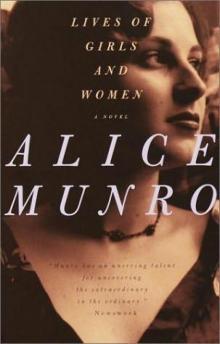 Lives of Girls and Women
Lives of Girls and Women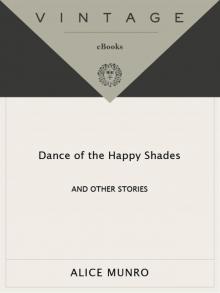 Dance of the Happy Shades
Dance of the Happy Shades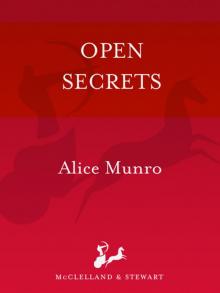 Open Secrets
Open Secrets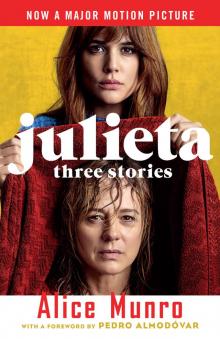 Julieta (Movie Tie-in Edition)
Julieta (Movie Tie-in Edition)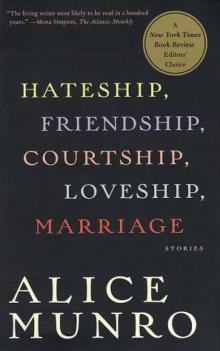 Hateship, Friendship, Courtship, Loveship, Marriage: Stories
Hateship, Friendship, Courtship, Loveship, Marriage: Stories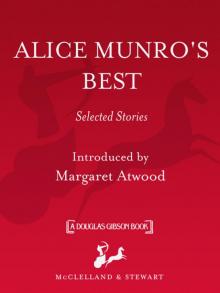 Alice Munro's Best
Alice Munro's Best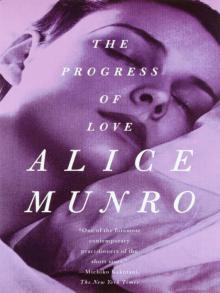 The Progress of Love
The Progress of Love Selected Stories
Selected Stories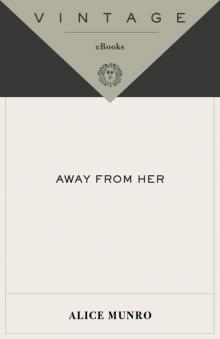 Away from Her
Away from Her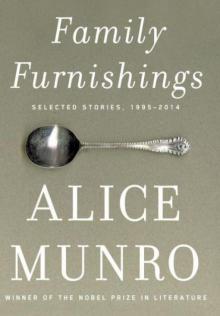 Family Furnishings
Family Furnishings Moons of Jupiter
Moons of Jupiter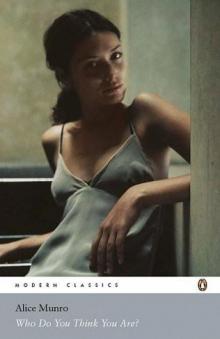 Who Do You Think You Are?
Who Do You Think You Are?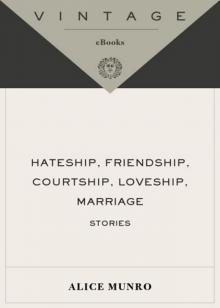 Hateship, Friendship, Courtship, Loveship, Marriage
Hateship, Friendship, Courtship, Loveship, Marriage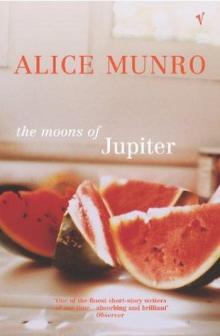 The Moons of Jupiter
The Moons of Jupiter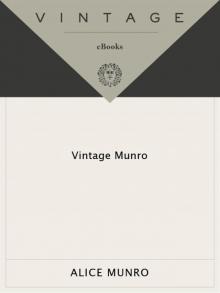 Vintage Munro
Vintage Munro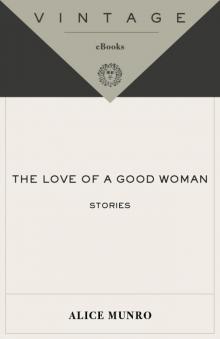 The Love of a Good Woman
The Love of a Good Woman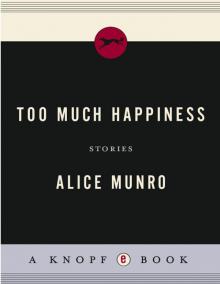 Too Much Happiness
Too Much Happiness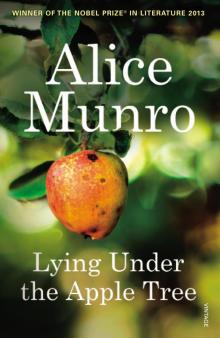 Lying Under the Apple Tree
Lying Under the Apple Tree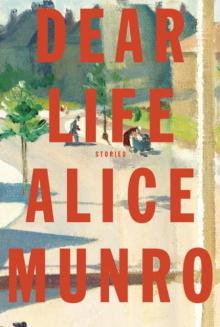 Dear Life
Dear Life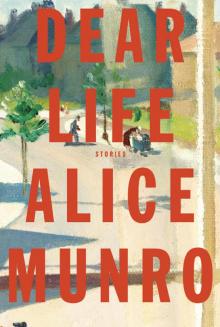 Dear Life: Stories
Dear Life: Stories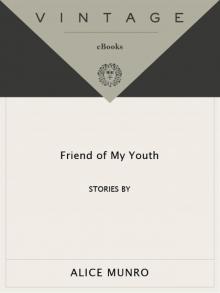 Friend of My Youth
Friend of My Youth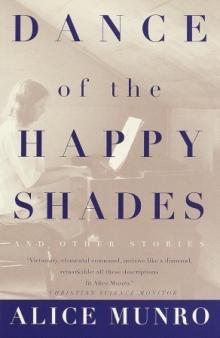 Dance of the Happy Shades: And Other Stories
Dance of the Happy Shades: And Other Stories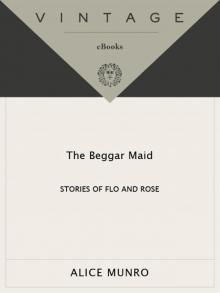 The Beggar Maid
The Beggar Maid